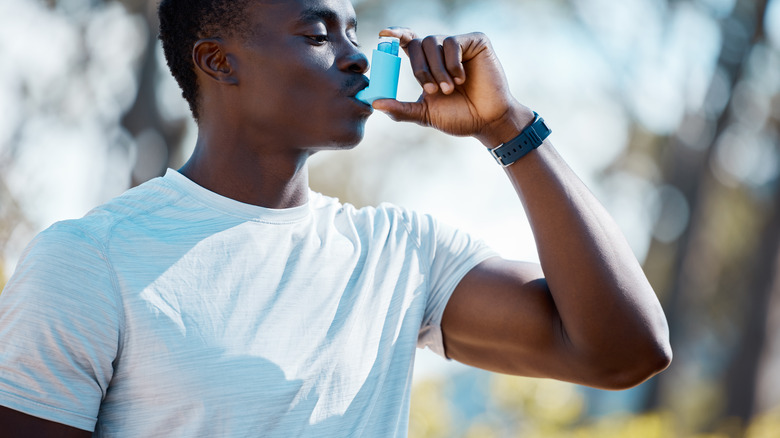What Happens To Your Lungs When You Don't Drink Enough Water
Staying well-hydrated is not merely a matter of convenience; it's necessary for your overall well-being. The role of water in sustaining your health is multifaceted and profound. A healthy adult should drink between 11.5 cups (92 ounces) and 15.5 cups (124 ounces) of fluids a day (via Mayo Clinic). However, recent research from the Centers for Disease Control and Prevention (CDC) shows that adults only drink an average of 5.5 cups (44 ounces) of water daily.
Drinking water has numerous benefits for your body, such as promoting healthy digestion, regulating body temperature, and enhancing respiratory health. Your lungs are an incredibly complex and delicate part of your body that play a crucial role in breathing. To keep your lungs functioning at their best, it is vital to keep them hydrated with a consistent supply of water. This way, your lungs can perform their intricate job of exchanging oxygen and carbon dioxide, helping you to breathe easier.
The link between dehydration and respiratory problems
One of the primary ways in which dehydration affects the respiratory system is by reducing the production of mucus. Mucus is a critical component of our body's defense mechanism against airborne pollutants, irritants, and pathogens (per the U.S. Environmental Protection Agency (EPA)). It acts as a lubricant, trapping foreign particles and preventing them from reaching the delicate lung tissues. When dehydration sets in, the body conserves water, and this conservation often leads to a decrease in mucus production. As a result, the respiratory airways become more susceptible to irritation and infection, as they lack the protective barrier provided by adequate mucus.
A study published in Thorax in 2018 shows that when you're dehydrated, the elasticity of your lung tissues is compromised. This means it becomes harder for your lungs to expand and contract efficiently with each breath. When your lung tissues lack sufficient fluids, it can reduce flexibility, making breathing more challenging and increasing the risk of lung-related issues.
Dehydration and lung diseases
According to a 2006 report published in the American Journal of Respiratory Cell and Molecular Biology, the link between dehydration and respiratory problems becomes even more evident in individuals with pre-existing respiratory conditions, such as chronic obstructive pulmonary disease (COPD), bronchitis, or asthma. Dehydration can exacerbate the symptoms of these conditions, leading to increased breathlessness, coughing, and discomfort. In COPD, for instance, the airways are already narrowed and inflamed, and dehydration can further constrict these air passages, making it even more challenging to breathe.
Dehydration can make it harder to breathe and can trigger asthma attacks and allergic reactions. A 2019 report in the Journal of Exercise Rehabilitation showed that dehydration can lead to thickening of the mucus layer in the airways, which can make it more difficult to breathe and can trigger EIA and anaphylaxis. It can also lead to increased airway resistance, inflammation, and reduced airway surface liquid production, all of which can make the airways more susceptible to narrowing of the airways in the lungs.
Adequate hydration is crucial for transporting oxygen from the lungs to the rest of the body. Dehydration can lead to reduced blood volume (per Mayo Clinic) and thicker blood (according to the Heart Foundation), impairing the body's ability to deliver oxygen effectively. This is especially concerning for individuals with lung diseases who already have compromised oxygen exchange.
Prioritizing hydration for healthy lung function
Staying hydrated is vital for keeping your body in top shape, especially when it comes to your lungs. To make sure you're drinking enough fluids, try making water your go-to drink, and bring a reusable water bottle with you wherever you go. Remember to sip water regularly throughout the day rather than waiting until you're thirsty since thirst is often a sign that you're already dehydrated. If you find plain water boring, add a slice of lemon or cucumber for a tasty twist.
In addition to drinking water, you can also incorporate hydrating foods into your diet. Fruits and vegetables high in water content, such as watermelon, cucumbers, and oranges, can be particularly beneficial (per Healthline). Not only do these foods help you stay hydrated, but they also provide your body with essential vitamins and minerals that support lung function and overall well-being. By making hydration a priority and incorporating it into your daily routine, you can proactively improve your lung health and your overall well-being.




